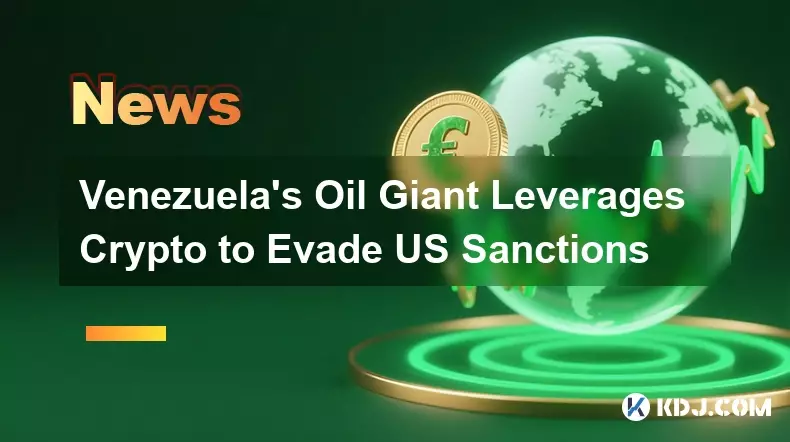 |
|
 |
|
 |
|
 |
|
 |
|
 |
|
 |
|
 |
|
 |
|
 |
|
 |
|
 |
|
 |
|
 |
|
 |
|
Cryptocurrency News Articles
Venezuela's Oil Giant Leverages Crypto to Evade US Sanctions
Apr 23, 2024 at 06:00 pm
Amid heightened US sanctions, Venezuela's PDVSA has pivoted towards cryptocurrency, primarily USDT, to mitigate risks and safeguard its oil trade revenues. This shift allows the state-owned company to bypass financial restrictions that threaten its foreign assets and maintain revenue stability. The transition to digital currency transactions, including a requirement for 50% USDT prepayment, is expected to facilitate smoother oil sales and enhance operational flexibility, while also presenting challenges in the global oil market.

Venezuela's Petrostate Leverages Cryptocurrency to Circumvent US Sanctions
Amid intensified economic sanctions imposed by the United States, Venezuela's state-owned oil company, Petróleos de Venezuela, S.A. (PDVSA), has accelerated its adoption of cryptocurrency, particularly Tether's USDT stablecoin, to safeguard its oil trade revenues and navigate the increasingly stringent financial restrictions.
Following the non-renewal of a general license that had permitted some trade between the United States and Venezuela, the US Treasury Department has set a May 31 deadline for businesses to cease all transactions with PDVSA. This move, driven by concerns over Venezuela's lack of progress in implementing electoral reforms, has prompted PDVSA to expedite its shift towards digital currency transactions.
USDT, a stablecoin pegged to the US dollar, has emerged as a preferred choice for PDVSA, offering a less volatile alternative to traditional fiat currencies and mitigating the risk of asset seizure or freezing. This strategic pivot, initiated in 2023, has gained significant momentum in the wake of the reinstated sanctions.
PDVSA's transition to cryptocurrency-based payments has necessitated operational adjustments. The company now mandates a 50% prepayment in USDT for new contracts and spot oil deals, excluding swaps. This requirement applies to all new clients, who must possess a digital wallet containing the necessary cryptocurrency to conduct transactions with the Venezuelan oil corporation.
However, the widespread use of USDT and other digital currencies in oil trading remains limited, with the US dollar retaining its dominance in the global market. This has posed challenges for PDVSA, as many traders and compliance teams remain wary of Bitcoin transactions due to their non-traditional nature and potential regulatory implications.
Consequently, PDVSA has frequently resorted to intermediaries to facilitate these transactions, particularly when dealing with large markets like China. The global oil market is closely monitoring PDVSA's operational reforms, as Venezuela's adoption of cryptocurrency may set a precedent for other countries facing similar economic constraints.
Despite the challenges, Venezuela's oil minister, Pedro Tellechea, remains optimistic about the country's trading prospects and its ability to cope with the new sanctions. He has asserted that Venezuela will continue to sign contracts and pursue oil and gas projects during the wind-down period imposed by the US and will seek individual oil transaction licenses thereafter.
The success of Venezuela's cryptocurrency-based oil trading strategy hinges on the broader adoption of digital currencies in international trade, particularly among major oil-consuming nations. As the global oil market undergoes transformation, PDVSA's pivot to cryptocurrency is a bold experiment that could have far-reaching implications for the industry and provide a lifeline for Venezuela's struggling economy.
Disclaimer:info@kdj.com
The information provided is not trading advice. kdj.com does not assume any responsibility for any investments made based on the information provided in this article. Cryptocurrencies are highly volatile and it is highly recommended that you invest with caution after thorough research!
If you believe that the content used on this website infringes your copyright, please contact us immediately (info@kdj.com) and we will delete it promptly.



























































